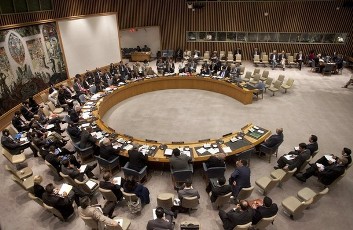UNSC to hold consultations on Sudan, South Sudan relations
January 21, 2013 (KHARTOUM/JUBA) – Members of the United Nations Security Council (UNSC) will on Tuesday hold consultations on relations between Sudan and South Sudan, in accordance with resolution 2046 adopted on 2 May 2012.

The African Union High Level Implementation Panel (AUHIP) said the two parties discussed security issues, the establishment of the Abyei administration, and the adoption of a matrix to facilitate the implementation of a range of agreements between the two.
The main issue in the agreements, reached in September last year, focuses on operationalisation of the buffer zone and a timetable to implement all the agreed issues, including the exportation of South Sudanese oil.
In a communiqué issued at end of the Joint Political and Security Mechanism (JPSM) meeting on Saturday, the AUHIP said both Sudan and South Sudan had made “substantial progress”, although the parties themselves appeared less convinced that significant positive steps had been made.
The two parties, it added, adopted a detailed and time-bound implementation matrix covering all security issues; a matrix for processing security-related complaints and concerns of the parties, which is already in use, as well as the speedy establishment of the Safe Demilitarised Border Zone (SDBZ).
According to the Thabo Mbeki-led panel, the JPSM also agreed to operationalise the Joint Border Verification and Monitoring Mechanism (JBVMM). The meeting reportedly identified the location of the JBVMM’s temporary headquarters in Kadugli, in South Kordofan, as well as sector headquarters to be located in each country.
“The JPSM also agreed to request the United Nations to increase the number of military personnel in the United Nations Interim Security Force for Abyei (UNISFA), providing protection for JBVMM border monitors,” the AUHIP statement said.
At the meeting, the two parties also reportedly declared they have withdrawn all forces from the disputed border areas to either side of the SDBZ centre line, while the JPSM, it added, held constructive discussions on the demilitarisation of the so-called “14-mile” area, a section of the border controversially included as part of the buffer zone negotiated.
South Sudan, however, said it had not been able to agree with Sudan on how to operationalise the SDBZ, adding that Sudan had made new demands regarding its level of representation in the proposed Abyei Area Council.
In a statement released Monday, the Sudanese negotiating delegation accused Juba of hampering activation of the buffer zone by refusing to withdraw its troops fully from the “14-Mile” area, a portion of land claimed by both parties on the border between South Darfur and Northern Bahr El-Ghazal states.
Khartoum further claims that Juba refuses to disengage with the rebel Sudan People’s Liberation Movement-North (SPLM-N) aand continues to harbour and support rebel groups despite South Sudanese commitments to sever ties.
On Abyei, the delegation said the disputed oil-producing region remains part of Sudanese territory up until the time of organising a referendum, thus they want to hold 50% of seats in the legislative council, stressing that in the past they accepted the 60% held by South Sudan because they were one country at the time and wanted to promote the idea of “attractive unity”.
According to the AUHIP, representatives of both Sudan and South Sudan on the Abyei Joint Oversight Committee (AJOC) would hold a special meeting in the contested region on 30 January to deliberate on proposals relating to police services in the area.
The presidents of Sudan and South Sudan met in Addis Ababa from 4 to 5 January, where they agreed on the implementation of the buffer zone, as well as the establishment of Abyei institutions and the police force. They also directed a timetable be set for resumption of oil exportation.
They are due to meet again on the sidelines of an African Union summit to be held on 24 January.
However, instead of discussing the fate of the Abyei region and the organisation of the referendum they must seemingly decide personally on differences over Abyei parliament.
Both parties have also yet to reach a compromise on the pull-out of troops from “14-Mile” or set a date for the resumption of oil exportation from South Sudan through Sudan.
(ST)
